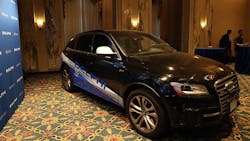Auto Execs Finally Coming Around to the Whole 'Self-Driving' Thing
Just a year ago, automotive executives who were jazzed at all by the prospect of self-driving cars were cautiously jazzed, tempering talk of possibilities with pronouncements that consumers liked the driving experience and would be slow to adjust, that legislation and insurance issues for the vehicles were years from being sorted out.
In 2015, however, the mood among OEMs seemed to shift, helped by events like a Delphi-engineered autonomous car traveling cross-country, Google handing out its bubble car to hundreds of real people to try out, and Tesla enthusiastically distributing its auto-navigation software, assuring customers that expeditious updates would cure any software glitches.
Indeed, when the tax, audit and advisory firm KPMG surveyed 796 C-level global auto executives this fall, 38% of them said autonomous vehicles are an “extremely important” trend in the industry.
That percentage might not seem particularly high, unless you consider that in 2014, only 3% considered autonomous technology extremely important.
Gary Silberg, KPMG’s automotive analyst, says he’s struck less by the jump in this year’s percentage than by how low it was in 2014. “This is such an important area—it has been for more than five years now,” he says.
He sees several reasons why it was low then. One was denial--“the sense of it’s not invented here first” (“here” meaning at traditional OEMs) “or that the technology is farther out.”
In 2015, observes Silberg, “there was a sense of this becoming real. People saw the product. You’re seeing announcements from Google and Tesla, and the potential of Apple entering the industry and startups like Faraday future actually putting prototypes on the ground.”
The KPMG survey was global, with only about 10% of respondents from the U.S. In general, U.S. executives were the most eager to embrace autonomous technology. Forty-six percent said autonomous vehicles are extremely important and 58% said connected-car technology is vital.
“That’s an important nuance,” says Silberg. “The U.S. is always more advanced in my view on thinking of the implications” of technology.
The OEMs realized for the last several years that they needed to lead on this, but only this year did things begin to gel, says Silberg.
“You started to see announcements within the industry: GM is going to have their Supercruise, Toyota is going to have autonomous vehicles for the Olympics … Ford announced they’re going to have self-driving cars. There was actual tangible movement.”
For the first time, the money was there in a big way, too. “You actually saw capital—real money, real projects—allocated to the business. There are now billions of dollars being put forth, so I think now within organizations around the globe, people are saying ‘OK, we’ve got real budgets.’”
Asked who was the most groundbreaking, survey respondents ranked BMW first, followed by Toyota, Ford and Honda. Among U.S. executives, Tesla ranked No. 2, behind Honda.
Silberg was surprised BMW came out on top, considering that Audi is more public about its autonomous push. “Maybe it’s because of their brand—BMW has a brilliant reputation of being very high-tech and avant garde. A lot of executives think that about them.” Stretched resources at the Volkswagen Group after the emissions cheating scandal, which Audi is a part of, could also have diluted respondents’ outlook.
Among the Detroit Three, Ford ranked higher than GM. “Ford is perceived in the industry as wanting to be leaders in autonomy and connectivity and new business models, Silberg says. “They have a big operation in the Valley now. They’ve announced their pilots that they’re doing all over the world.
“They’re trying to be out front, for sure. But trust me—GM isn’t waiting, either.”
About the Author

Laura Putre
Senior Editor, IndustryWeek
As senior editor, Laura Putre works with IndustryWeek's editorial contributors and reports on leadership and the automotive industry as they relate to manufacturing. She joined IndustryWeek in 2015 as a staff writer covering workforce issues.
Prior to IndustryWeek, Laura reported on the healthcare industry and covered local news. She was the editor of the Chicago Journal and a staff writer for Cleveland Scene. Her national bylines include The Guardian, Slate, Pacific-Standard and The Root.
Laura was a National Press Foundation fellow in 2022.
Got a story idea? Reach out to Laura at [email protected]
